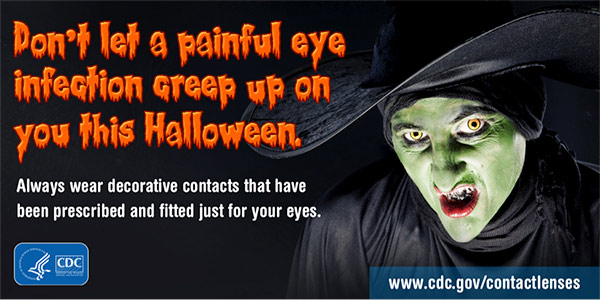
By Linda Conlin, Pro to Pro Managing Editor
Along with all the treats and fun, Halloween is one of the trickiest holidays for eye safety. Halloween shops pop up everywhere like late season mushrooms, and many sell “costume” contact lenses. Decorative contact lenses, purchased without prescription, pose a serious risk of eye infection and injury. Because they have not been fitted properly, confirmed as having met health regulations, and dispensed without instruction to the wearer, risks include bacterial infections, conjunctivitis, corneal scratches, corneal ulcers and vision loss, among others. According to the FDA, “They are not cosmetics or over-the-counter merchandise. They are medical devices regulated by the U.S. Food and Drug Administration. Places that advertise them as cosmetics or sell them over-the-counter, without a prescription, are breaking the law. … In addition, some of these contact lenses may be counterfeit devices or may not have been cleared or approved by the FDA.” In many cases, these contact lenses pass through our ports of entry because they are described as cosmetics or accessories. Vendors often don’t know that they are breaking the law or posing a public health risk. Keep in mind that teens are particularly attracted to adding wild-looking contact lenses to costumes, and may not realize the danger in purchasing them over the counter.
Costume contact lenses aren’t the only goblins to watch out for. Prevent Blindness America warns about the hazards other parts of costumes pose. Masks, floppy hats, wigs and eye patches can obstruct vision. Makeup is a good alternative to a mask, but the cosmetics should be hypoallergenic and applied by an adult, with care to avoid contact with the eye. (Some costume cosmetics may not be FDA approved, either.) Props such as spears, swords or wands pose an obvious risk of injury, especially when costumes drag on the ground. For very young children, lollipop sticks can cause injury.
As ECPs, we continually educate our patients about eye safety. Out of the office, we can help promote eye safety, too. A well-lighted front porch and walking areas free of obstacles, such as decorations, will help prevent injuries from a fall. Consider distributing healthier treats or non-food items such as stickers, notepads or crayons, but avoid novelties that could pose a choking or injury hazard. And as for vendors of over-the-counter contact lenses, put a little scare into them. You can report brick and mortar stores to your state department of health or consumer affairs. For websites selling contact lenses without prescription, report it to the FDA at https://www.accessdata.fda.gov/scripts/email/oc/buyonline/english.cfm.
To learn about the beneficial uses of contact lenses beyond vision correction, go to our CE, Therapeutic Contact Lenses and Beyond, at 2020mag.com/ce. Have a safe and happy Halloween!













